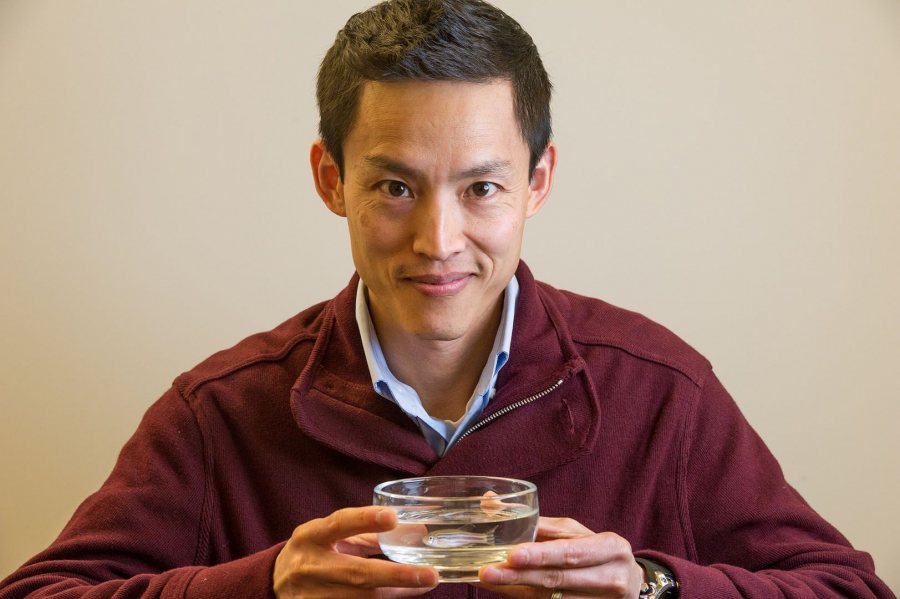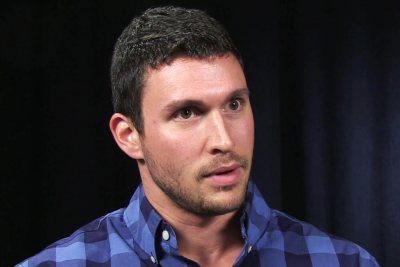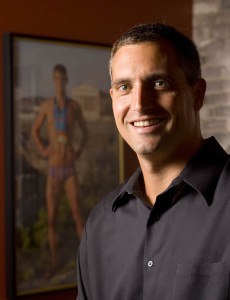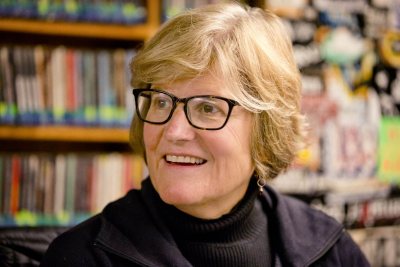
Bates in the News: Aug. 26, 2016
Voot Yin ’96
MDI Biological Laboratory researchers win heart-drug patent — Portland Press Herald
Researcher Voot Yin ’96 and a colleague at Mount Desert Island Biological Laboratory have won a patent to continue work on a drug that could solve a common and urgent medical problem: helping heart tissue regenerate after a heart attack.

Voot Yin ’96, a researcher at Mount Desert Island Biological Laboratory, holds a bowl of zebrafish, a species that provided clues to MSI-1436’s possible use as a heart drug. (Photograph by MDI Biological Laboratory)
The Portland Press Herald story notes that the “patent award represents a major step forward in moving the molecule MSI-1436 toward clinical trials in humans.”
The stakes are high. “There are currently no approved treatments to stimulate regeneration of heart muscle in humans,” writes reporter Dennis Hoey.
Yin’s partner is Kevin Strange, president of MDIBL, and they’re collaborating with Michael Zasloff, M.D.
Yin’s work with zebrafish, who have a 70 percent match with human genetics, offered the first clues to MSI-1436’s possible use as a heart drug.
Unlike the human heart, the zebrafish heart “robustly regenerates missing or damaged tissue in as little as 30 to 60 days,” Yin explains. When he and his colleagues introduced MSI-1436 into zebrafish, the regeneration accelerated.
“The scientists believe the molecule could activate similar genes in humans,” writes Hoey.
Encouraging results have been found in mice, too. “If MSI-1436 shows similar results in humans, it will be a game-changer for patients who suffer a heart attack and/or are living with heart problems,” Yin says.
Shirl Penney ’99
High finance, horse racing, and a “special” horse named Flipcup — Thoroughbred Daily News
As thoroughbred racing’s spotlight shifted to Saratoga Springs in August, the turf media called on Shirl Penney ’99, who shared his story of growing up in Eastport, Maine, with Bates Magazine in 2005.
Since then, Penney founded Dynasty Financial Partners, a firm that supports wealth-management advisers with what Forbes calls “a game-changing integrated platform of technology and services.”
Thoroughbred Daily News writer Joe Bianca, in his story “From Last to First,” described Penney’s life this way:
He has essentially lived two dichotomous, massively eventful lives in those 39 years, overcoming extreme poverty and immense odds as a child to establish himself in adulthood as a power player on Wall Street and a thriving presence in the thoroughbred industry.

Penney’s 5-year-old mare Flipcup “is special to us because she’s a member of our family,” Penney tells Thoroughbred Daily News. (Michael Burns Photography)
Meanwhile, WRGB-TV in Albany enlisted Penney and his wife, Mary Ann, for a whimsical story on the naming of their excellent filly, Flipcup. (She’s sired by Milwaukee Brew, so the name does indeed reflect a certain drinking game.)
Beyond that angle, Flipcup “is special to us because she’s a member of our family,” Penney says.
“We have two daughters…they hang out with her every morning. We named her, we bred her, we’ve been around her ever since she’s been a baby. Any chance you get to go out and watch a member of your family compete, it makes it extra special.”
Penney was recently named a Finance Leaders Fellow of the prestigious Aspen Institute.
Clayton Spencer
Higher-education policy and its relevance for the future of our economy and democracy — Harvard Magazine
Against the backdrop of public discourse that’s “defined increasingly by ‘post-factual’ and policy-annihilating debate,” a new book by higher-education experts William Bowen and Michael McPherson is a satisfying read, writes President Clayton Spencer in a review published in Harvard Magazine.
Bowen and McPherson’s Lesson Plan offers readers a “short, yet disarmingly rich and precise, primer on higher-education policy and its compelling relevance for the future of our economy and democracy.”
The authors, Spencer writes, believe that any course correction in higher-education policy “requires moving beyond our current preoccupation with ‘access and affordability’ — maximizing the number of people who begin college.”
Instead, policy should look at “what we need to do to increase the number of people who complete a degree.”
Jenna Ginsberg ’94
The experience of transitioning revealed male privilege — Lewiston Sun Journal
The Lewiston Sun Journal’s feature “Transgender in Maine” profiled several transgender Mainers, including Jenna Ginsberg ’94, who transitioned to a woman about a decade ago.

Jenna Ginsberg ’94 profiled by the Lewiston Sun Journal for its story “Transgender in Maine” (Andree Kehn / Lewiston Sun Journal)
Reporter Lindsay Tice writes that for Ginsberg, who was working for a Maine ski resort at the time of her transition, the experience revealed the “privilege” that she’d had as a man in that workplace.
At the resort, Ginsberg says that she had enjoyed “independence and autonomy as a man.” But as a woman, she was “told how to do things and micromanaged.”
After a dozen years of very positive performance reviews, “all of the sudden I had a negative performance review for the same types of behaviors,” she tells the Sun Journal.
“I literally went from being [called] ambitious….to being told I was pushy.”
An alpine skier who majored in philosophy and psychology at Bates, Ginsberg now runs her own company, All Sports Events, providing support for sports events, including timing, logistics, and scoring.
Chris Petrella ’06
Why the U.S. is right to move away from private prisons — The New Yorker

Chris Petrella ’06 is a lecturer at Bates who this fall teaches the First Year Seminar “This American Death,” about U.S. prison executions. (Phyllis Graber Jensen/Bates College)
The news media turned to Chris Petrella ’06 this week after the Department of Justice announced it would stop using private prisons.
The New Yorker used Petrella’s insights to explain why people of color are over-represented in private prisons to an even greater degree than in the overall prison system.
It’s because private prison companies can refuse to incarcerate people whose advanced age or poor health — factors that “serve as a proxy for race” — might cost them money.
Meanwhile, Petrella tells Business Insider that lobbying efforts used by private prison companies, such as seeking to be restructured as real estate investment trusts, reveal their true nature.
Behaving like a real estate business is a “major, major problem,” he says, “because when we’re talking about incarcerating human bodies, the language of real estate is just so grievously inappropriate.”
Peter Carlisle ’91
It takes a village, whose citizens include Carlisle, to raise an Olympic champion — The Ringer
Seeking insights about the marketability of Olympic athletes, the media sought out sports agent Peter Carlisle ’91 early and often during the Rio Games.

In 2010, Peter Carlisle ’91 poses in his Portland, Maine, office in front of a poster of Michael Phelps wearing his Athens medals. (Phyllis Graber Jensen / Bates College)
Carlisle, who represents household-name Olympians like Simone Biles and Michael Phelps, was dubbed “the visionary agent” by The Ringer for his work with Phelps.
Specifically, Carlisle was able to secure “major partnerships that span the four years of an Olympic cycle.” In so doing, he “brought security to his client while also giving the brands an incentive to continue to promote their investment even during the lull between the Athens and Beijing games.”
While “there is no simple equation for Olympic endorsement deals,” according to The Washington Post, “the athletes with the highest profiles” can ink several-year deals over $1 million.
Citing Carlisle as its source, the Post says that “swimmers and women’s gymnasts typically have a leg up on other sports because of their prominence and demographic appeal.”
After Ryan Lochte and two teammates did their dumb deed in Rio, Fortune turned to Carlisle, whose work with Phelps has included efforts to raise the visibility of U.S. swimming, for context.
“The cumulative quality and nature of the exposure related to swimming certainly influences the level of interest among brands” in representing Lochte and his teammates.
Then there are athletes like U.S. shooter Kim Rhode, who won a sixth medal in Rio but won’t gain significant sponsorship.
Carlisle was quoted by Snopes in its story debunking the rumor that Rhode can’t cash in because she supports Donald Trump and the Second Amendment.
The truth, as he explains, has to do with “limited exposure. If the sport itself doesn’t provide a consistent platform for the athletes to become recognizable and maintain relevance, there’s limited value to a sponsor.”
Margaret Kendall Buschmann ’72 and Fritz Buschmann ’71
They’re caring for an all-time high of 80 parrots of all sizes, shapes, colors, and dispositions — Bangor Daily News
“Margaret and her husband, Fritz, are the founders and sole operators of Siesta Sanctuary, which the couple describe as ‘assisted living for retired parrots,'” writes Bangor Daily News reporter Aislinn Sarnacki.
“For more than a decade,” the story continues, “they have been taking in rescued and displaced parrots and giving them a permanent home at the sanctuary, which is connected to the Buschmann house in Harmony,” about 35 miles north of Waterville.
Parrots can live for decades, which explains why the Buschmanns take in many of their birds. It’s because “people’s lives change,” Margaret says.
“The biggest source of parrots for us is older people, who have had a beloved pet for 30 years and now have to go into a nursing home or a condo that doesn’t allow birds, and they’re just beside themselves on what they’re going to do with their birds.”
Margaret and Fritz, who is the son of the late German professor August Buschmann, were married in October 1972 and moved to Harmony to raise animals on 50 acres of farmland. He’s a surveyor, and she’s a diabetes educator.




